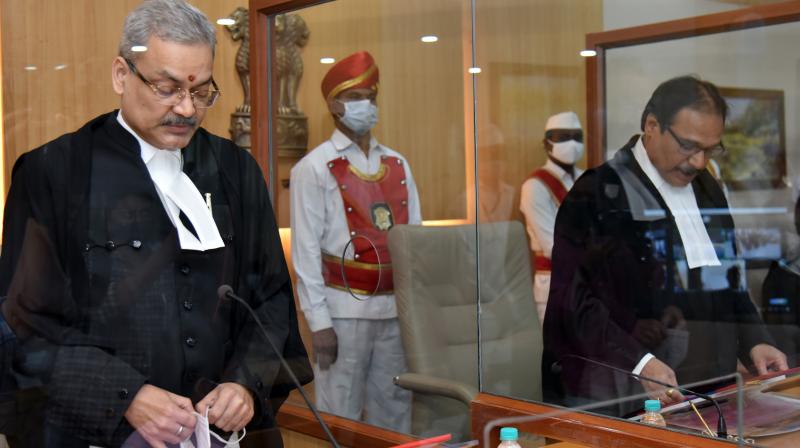
“No Work No Pay” Not Applicable Where Employer Prevents Employee From Working: AP HC Allows Arrears of Salary to Disabled
Employee
Contents News/Article Date: 15th September 2022
Relating to which Act: the disability from which the petitioner suffered is a ‘locomotor disability’ and covered under Section 2(1)(i)(v) read with Section 2(1)(o) of the Act, 1995 and his case is covered under Section 47 of the Act, 1995.”
Government Act – Section 2 in The Persons with Disabilities (Equal Opportunities, Protection of Rights and Full Participation) Act, 1995
Type: Judgement delivered by The bench of Justice Ravi Nath Tilhari of Andhra Pradesh, High Court
Relevance of this news: Karma Management Global Consulting Solutions Pvt Ltd has tied up with S. D. Puri & Co. a leading firm of Advocates dispensing justice in terms of disputes, litigation, the charter of demands, unionized issues, legal and para-legal matters, and this alliance with Karma Management, has taken both the organization on a giant leap forward to handle the work of its elite clients on Pan India basis.
Many of the client’s work related to industrial disputes and litigations are represented by Karma and S. D. Puri in the various courts of law in any of the States.
In fact, many corporate clients seek advice and guidance on operational issues which are handled by them in a fair and judicious manner.
Subject: “No Work No Pay” Not Applicable Where Employer Prevents Employee From Working: AP HC Allows Arrears of Salary to Disabled Employee
For greater details, appended below is a summary of the writ petition
“No Work No Pay” Not Applicable Where Employer Prevents Employee From Working: AP HC Allows Arrears of Salary to Disabled Employee
The Andhra Pradesh HC on Wednesday ruled that “No Work No Pay” is not applicable where the employer prevents employees from working.
The bench of Justice Ravi Nath Tilhari stated that “the disability from which the petitioner suffered is a ‘locomotor disability’ and covered under Section 2(1)(i)(v) read with Section 2(1)(o) of the Act, 1995 and his case is covered under Section 47 of the Act, 1995.”
In this case, The petitioner was appointed as a casual conductor in the Corporation in the year 1984 and his services were regularized in the year 1987.
While he was on duty he met with an accident and was hospitalized after first aid treatment he was sent to Corporation hospital, Tarnaka, Hyderabad from where on medical advice he was sent to Nizam’s Institute of Medical Sciences and in the operation of spinal cord his two discs were removed.
The corporation retired the petitioner from service on medical grounds vide order dated 21.07.2001. The petitioner made several representations for providing alternative employment to which the corporation paid no attention.
The petitioner filed a Case before the Commissioner, Disabled Welfare & State Commissioner under the Persons with Disabilities Act, 1995 in which the Commissioner set aside the proceedings and directed the respondents to consider the petitioner’s claim in light of Section 47 of the Persons with Disabilities (Equal Opportunities, Protection of Rights and Full Participation) Act, 1995, within a specified period.
The issue for consideration before the bench was:
- Whether the petition suffers from laches?
- Whether the petitioner is entitled to the payment of arrears of salary for the period w.e.f 21.07.2001 upto 21.02.2007?
The bench while dealing with the first issue stated that the disability by itself can be considered to be a ground disentitling the petitioner in not approaching this Court at the earlier point of time. From the facts on record, also it is evident that the petitioner did not give up his claim and continuously requested the respondent Corporation to grant the salary/arrears of salary for the interregnum period by filing representations.
“No Work No Pay” Not Applicable Where Employer Prevents – Payment of arrears of salary for the period
The High Court observed that normally a person approaches the court, as a last resort, and with respect to a disabled person, it is only after finding no hope of justice from the respondent Corporation, the petitioner had to approach this Court. Under the circumstances as also in view of the settled law on the subject of the Act, 1995, this Court is not inclined to take the view that the writ petition suffers from laches so as to deny the statutory benefits to the petitioner.
While dealing with the second issue the bench opined that “so far as the payment of arrears of salary for the period in question is concerned, the petitioner was not at fault for not discharging the duties during the interregnum period for which the corporation was responsible as it failed to discharge its statutory duty. The petitioner cannot be deprived of the salary for the period claimed and cannot be made to suffer for the fault of the corporation. Under the Act, it was the statutory duty of the Corporation not to throw the petitioner out of service but to provide alternative employment to some other post with the same pay scale and service benefits, and if there was no such post available the supernumerary posts should have been created.”
In view of the above, the High Court allowed the petition.
Case Title: Sri Ch.S. Rajeswara Rao v. Govt., of A.P.
Bench: Justice Ravi Nath Tahari
Case No.: WRIT PETITION No.5486 OF 2011
